
AI-lectures
Lecture notes, slides and scripts (LaTeX sources) in AI, Robotics, Machine Learning, Maths, Optimization
Stars: 86
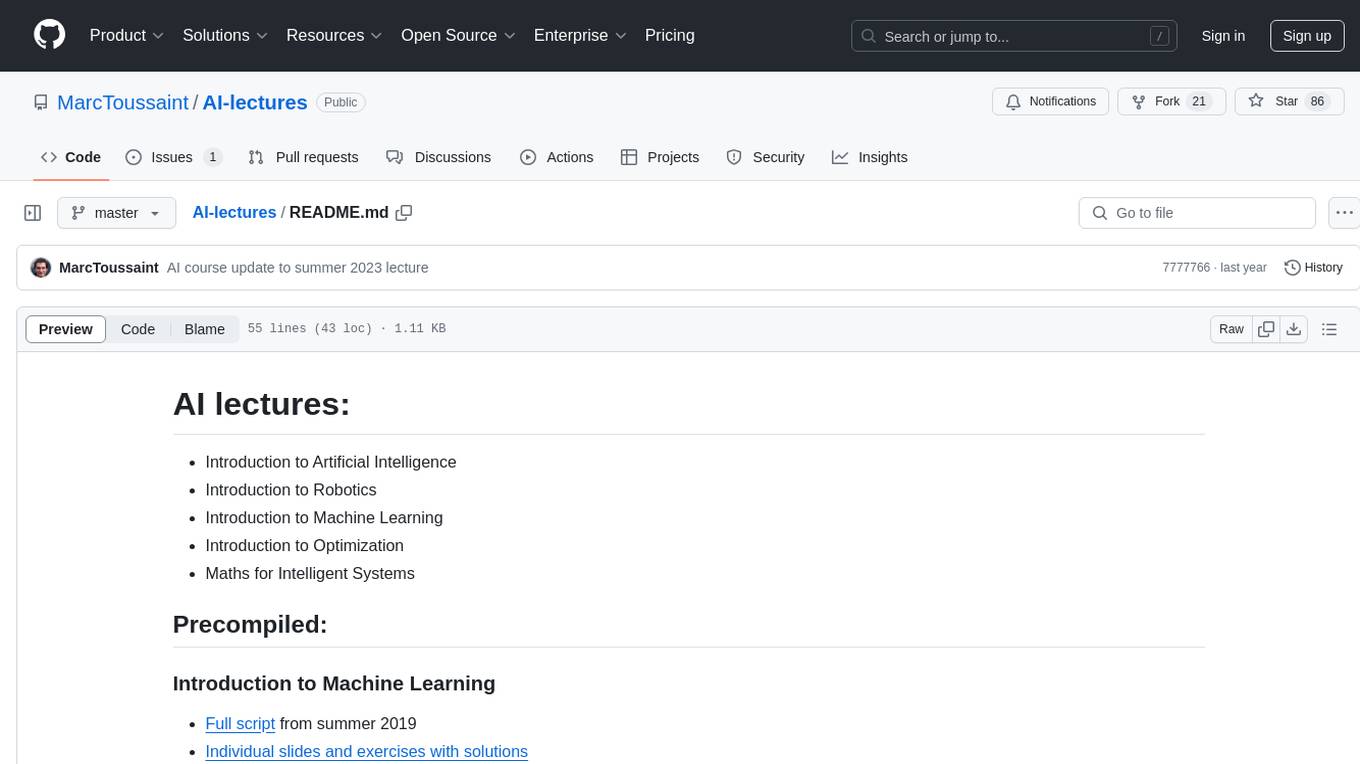
AI-lectures is a repository containing educational materials on various topics related to Artificial Intelligence, including Machine Learning, Robotics, and Optimization. It provides full scripts, slides, and exercises with solutions for different lectures. Users can compile the materials into PDFs for easy access and reference. The repository aims to offer comprehensive resources for individuals interested in learning about AI and its applications in intelligent systems.
README:
- Introduction to Artificial Intelligence
- Introduction to Robotics
- Introduction to Machine Learning
- Introduction to Optimization
- Maths for Intelligent Systems
- Full script from summer 2019
- Individual slides and exercises with solutions
- Full script from summer 2015
- Individual slides and exercises with solutions
Ubuntu packages to be installed:
sudo apt-get install \
texlive-latex-recommended \
texlive-latex-extra \
texlive-science \
fig2dev #or transfig for Ubuntu 16.04 !
Generate the shared pdf pics (from fig-files)
cd pics
./compile.sh
Generated pdf pics for a specific course
cd MachineLearning/pics
./compile.sh
Compile a course
cd MachineLearning
./compile.sh
Compile a single lecture
cd MachineLearning
pdflatex -interaction=nonstopmode 01-introduction
pdflatex -interaction=nonstopmode 01-introduction
For Tasks:
Click tags to check more tools for each tasksFor Jobs:
Alternative AI tools for AI-lectures
Similar Open Source Tools

AI-lectures
AI-lectures is a repository containing educational materials on various topics related to Artificial Intelligence, including Machine Learning, Robotics, and Optimization. It provides full scripts, slides, and exercises with solutions for different lectures. Users can compile the materials into PDFs for easy access and reference. The repository aims to offer comprehensive resources for individuals interested in learning about AI and its applications in intelligent systems.
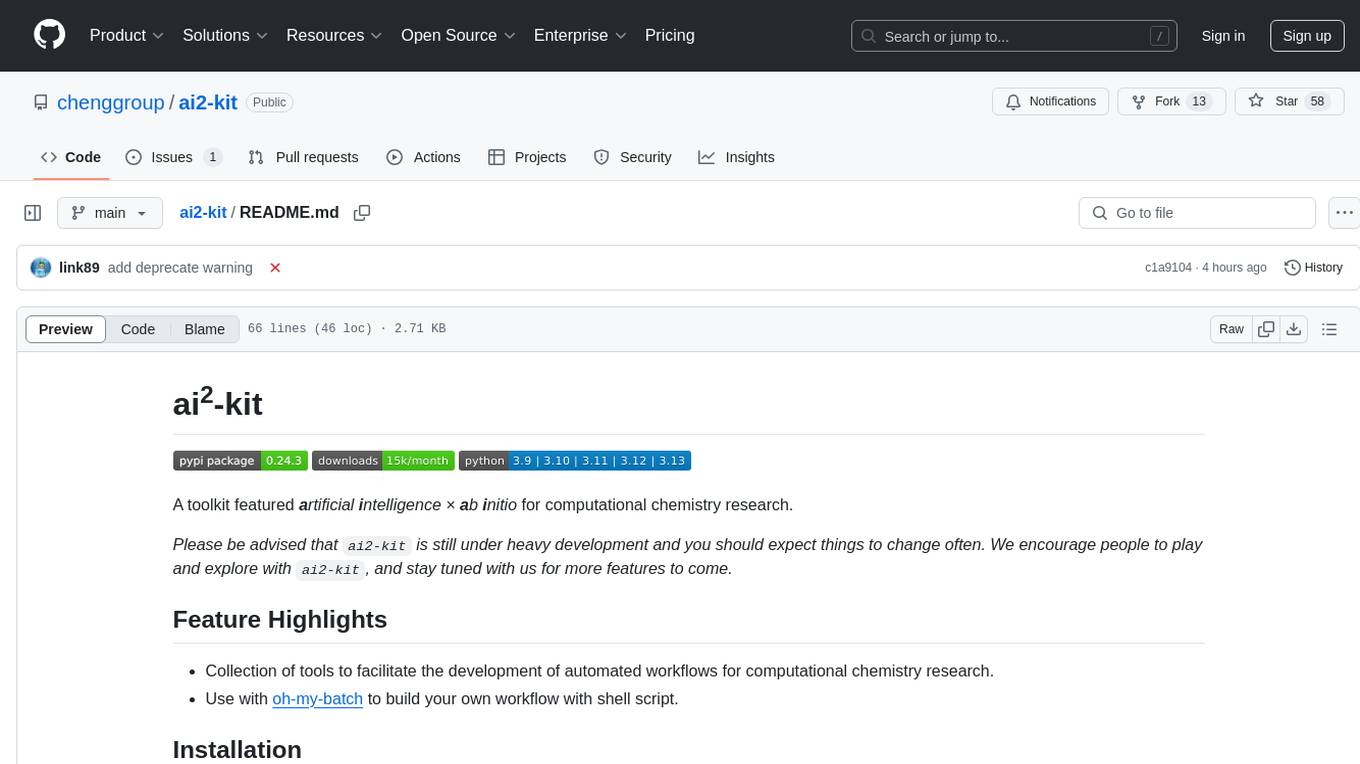
ai2-kit
A toolkit for computational chemistry research, featuring tools to facilitate automated workflows. Includes tools for NMR prediction, dynamic catalysis research, proton transfer analysis, amorphous oxides structure analysis, reweighting, and more. Users can install 'ai2-kit' via pip and explore various domain-specific and general tools for processing system data and filtering structures by model deviation.
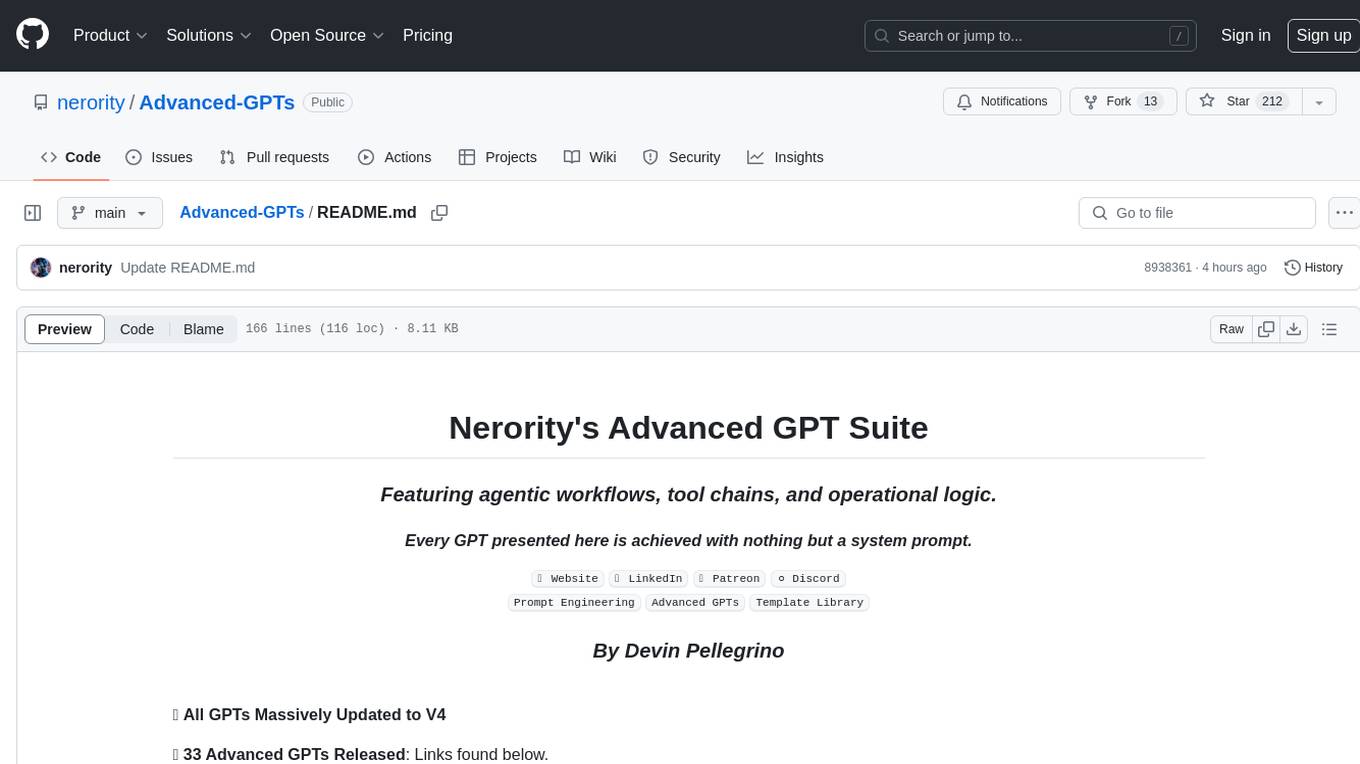
Advanced-GPTs
Nerority's Advanced GPT Suite is a collection of 33 GPTs that can be controlled with natural language prompts. The suite includes tools for various tasks such as strategic consulting, business analysis, career profile building, content creation, educational purposes, image-based tasks, knowledge engineering, marketing, persona creation, programming, prompt engineering, role-playing, simulations, and task management. Users can access links, usage instructions, and guides for each GPT on their respective pages. The suite is designed for public demonstration and usage, offering features like meta-sequence optimization, AI priming, prompt classification, and optimization. It also provides tools for generating articles, analyzing contracts, visualizing data, distilling knowledge, creating educational content, exploring topics, generating marketing copy, simulating scenarios, managing tasks, and more.
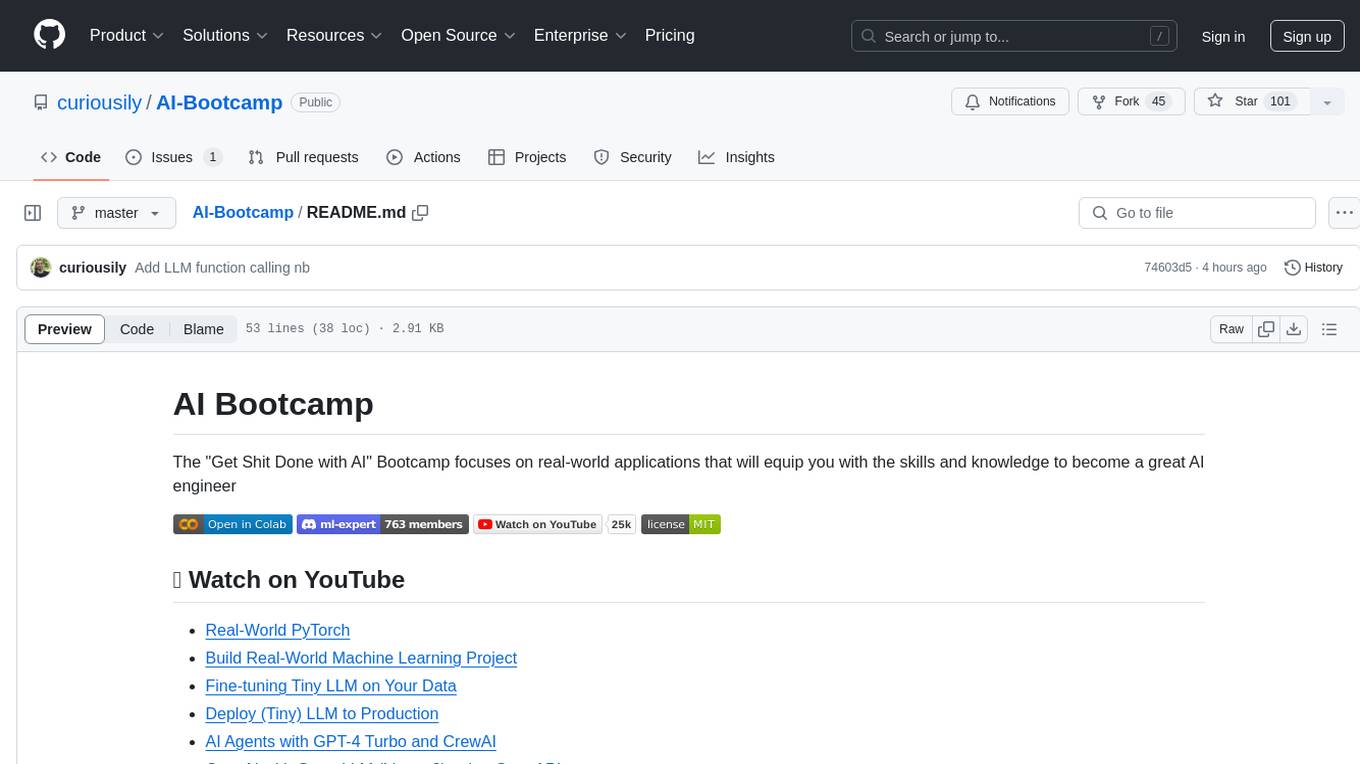
AI-Bootcamp
The AI Bootcamp is a comprehensive training program focusing on real-world applications to equip individuals with the skills and knowledge needed to excel as AI engineers. The bootcamp covers topics such as Real-World PyTorch, Machine Learning Projects, Fine-tuning Tiny LLM, Deployment of LLM to Production, AI Agents with GPT-4 Turbo, CrewAI, Llama 3, and more. Participants will learn foundational skills in Python for AI, ML Pipelines, Large Language Models (LLMs), AI Agents, and work on projects like RagBase for private document chat.
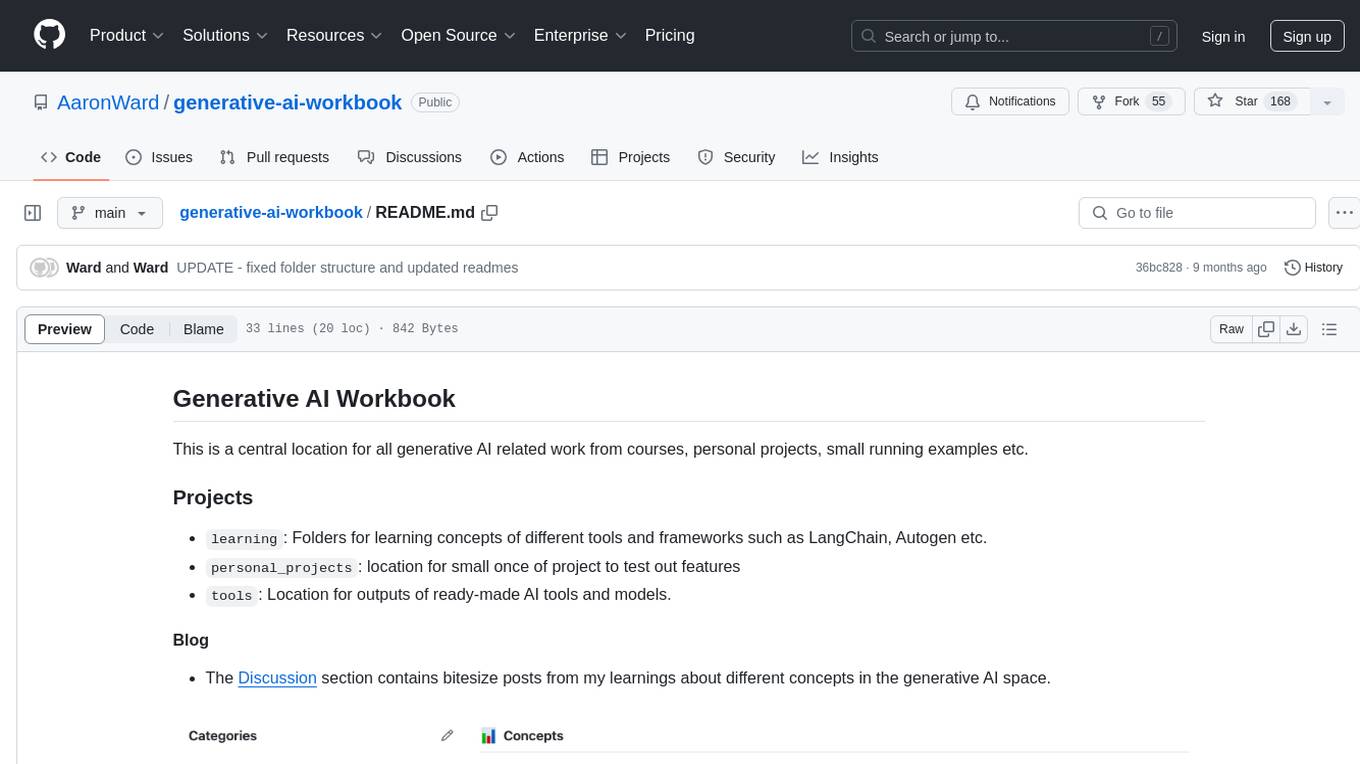
generative-ai-workbook
Generative AI Workbook is a central repository for generative AI-related work, including projects, personal projects, and tools. It also features a blog section with bite-sized posts on various generative AI concepts. The repository covers use cases of Large Language Models (LLMs) such as search, classification, clustering, data/text/code generation, summarization, rewriting, extractions, proofreading, and querying data.
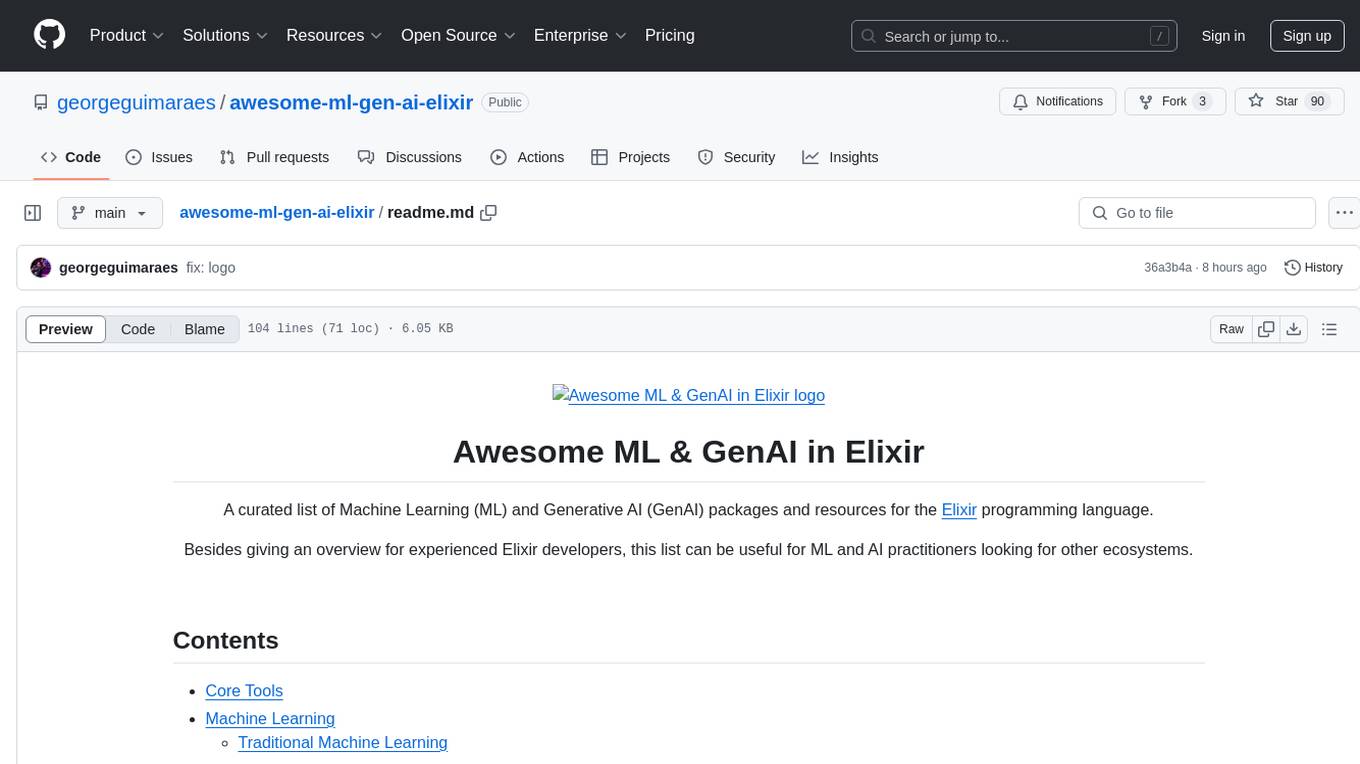
awesome-ml-gen-ai-elixir
A curated list of Machine Learning (ML) and Generative AI (GenAI) packages and resources for the Elixir programming language. It includes core tools for data exploration, traditional machine learning algorithms, deep learning models, computer vision libraries, generative AI tools, livebooks for interactive notebooks, and various resources such as books, videos, and articles. The repository aims to provide a comprehensive overview for experienced Elixir developers and ML/AI practitioners exploring different ecosystems.
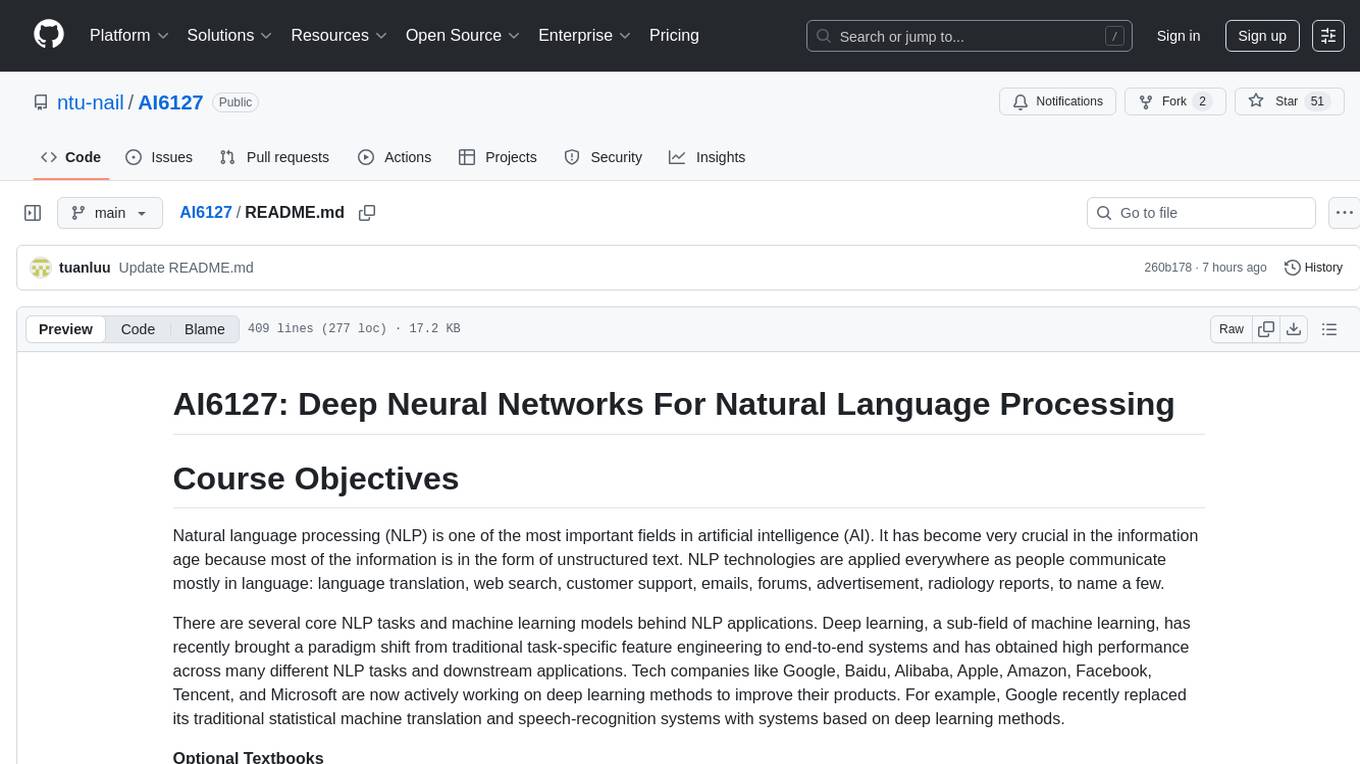
AI6127
AI6127 is a course focusing on deep neural networks for natural language processing (NLP). It covers core NLP tasks and machine learning models, emphasizing deep learning methods using libraries like Pytorch. The course aims to teach students state-of-the-art techniques for practical NLP problems, including writing, debugging, and training deep neural models. It also explores advancements in NLP such as Transformers and ChatGPT.
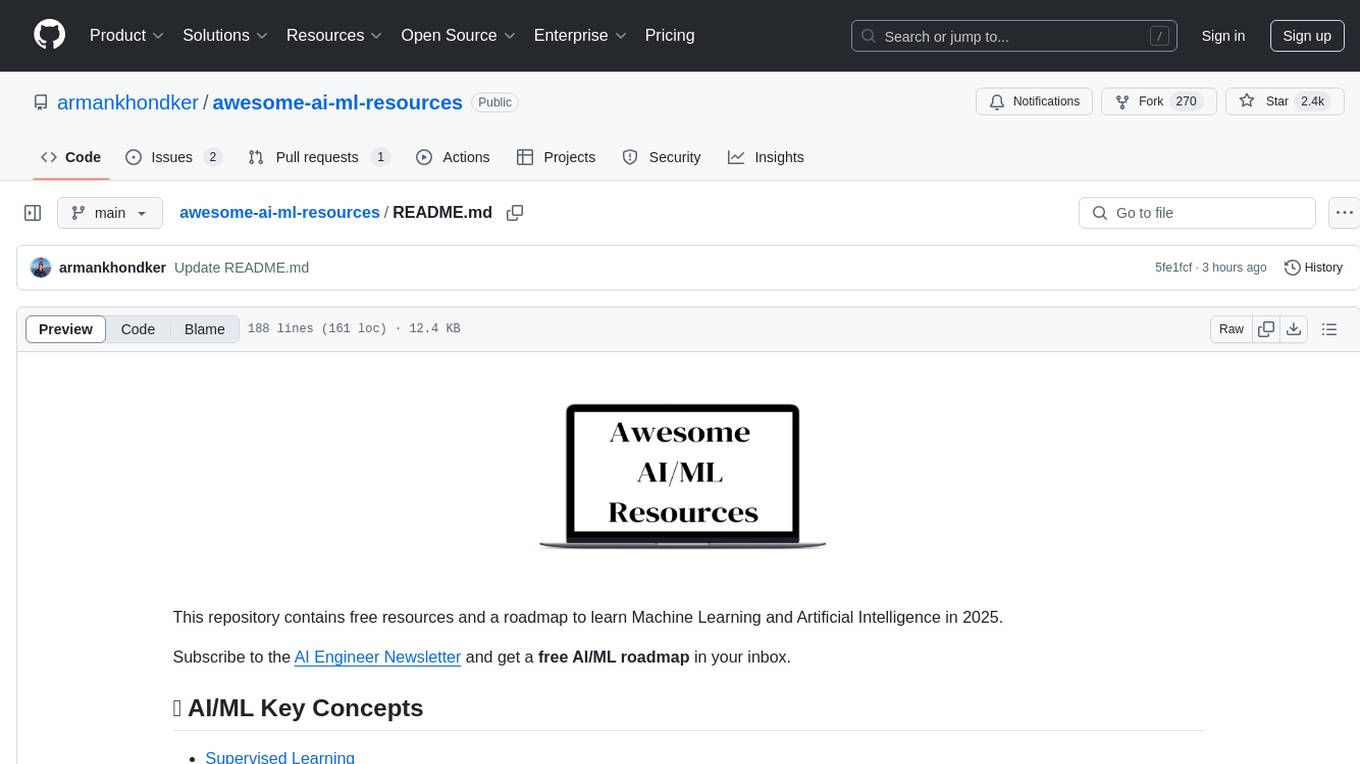
awesome-ai-ml-resources
This repository is a collection of free resources and a roadmap designed to help individuals learn Machine Learning and Artificial Intelligence concepts by providing key concepts, building blocks, roles, a learning roadmap, courses, certifications, books, tools & frameworks, research blogs, applied blogs, practice problems, communities, YouTube channels, newsletters, and must-read papers. It covers a wide range of topics from supervised learning to MLOps, offering guidance on learning paths, practical experience, and job interview preparation.
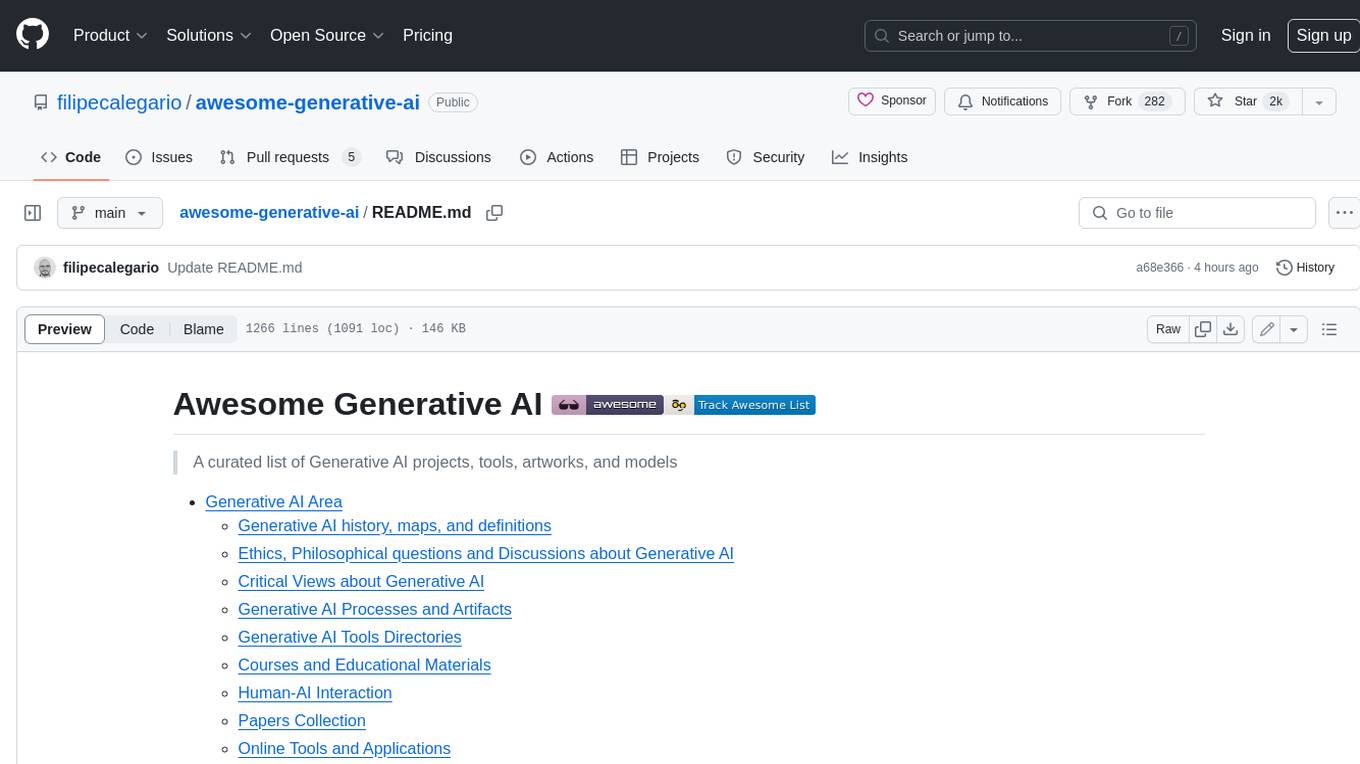
awesome-generative-ai
A curated list of Generative AI projects, tools, artworks, and models
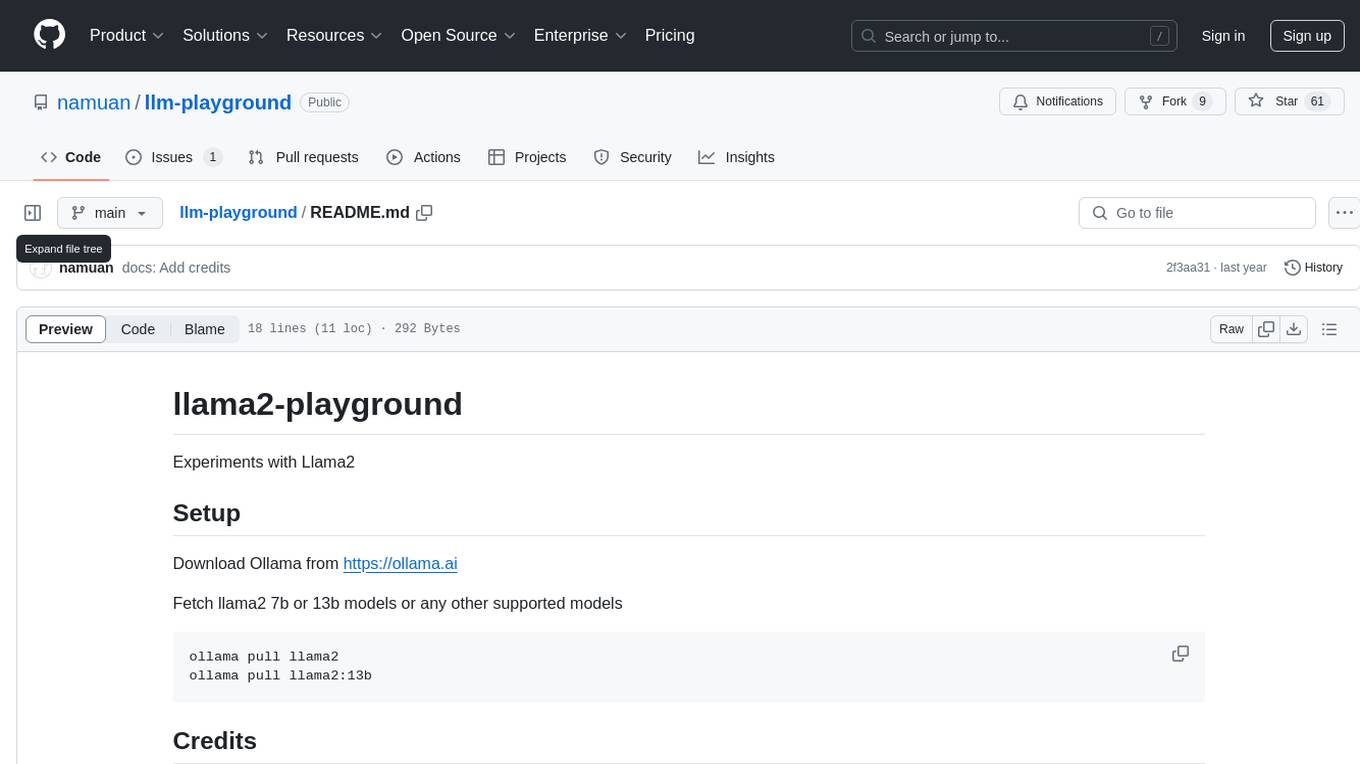
llm-playground
llm-playground is a repository for experimenting with Llama2, a language model. Users can download the Ollama tool and fetch different Llama2 models to conduct experiments and tests. The repository is maintained by a 10x-React-Engineer.
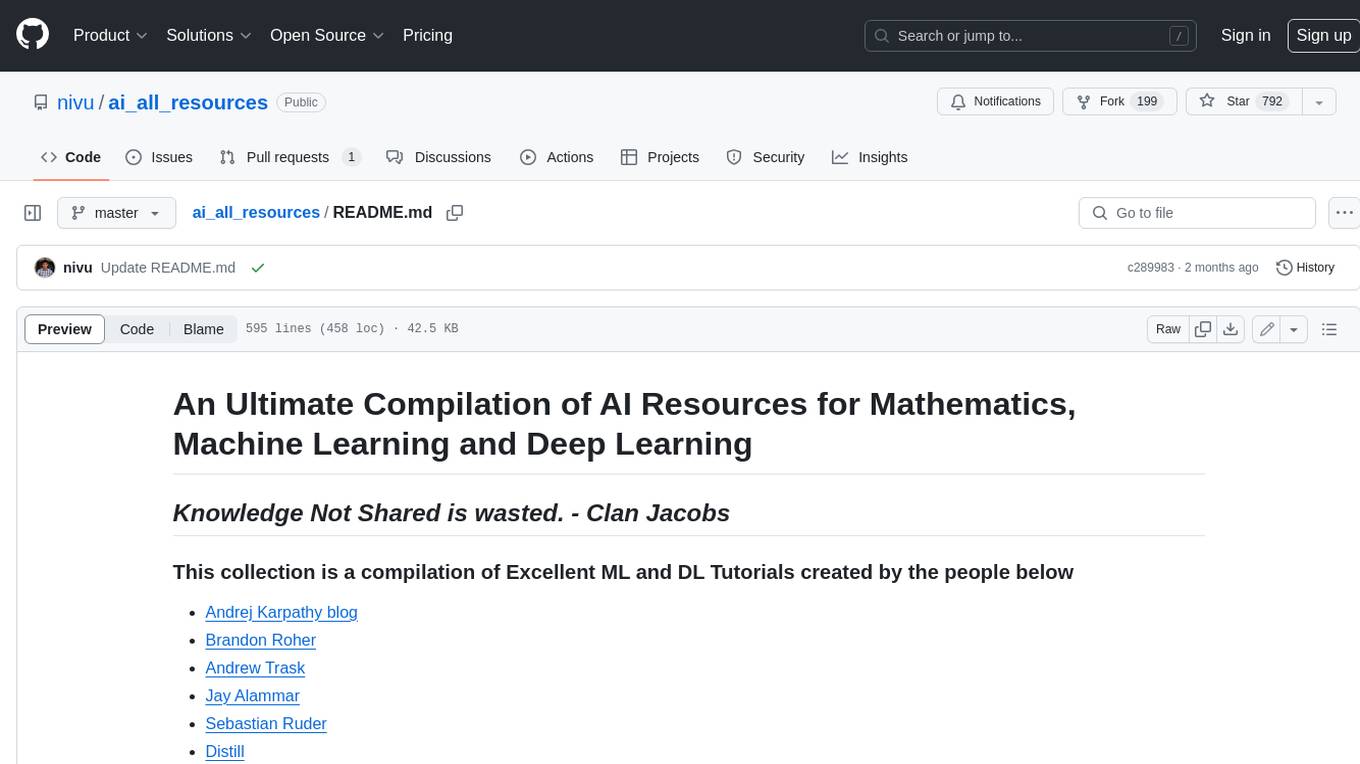
ai_all_resources
This repository is a compilation of excellent ML and DL tutorials created by various individuals and organizations. It covers a wide range of topics, including machine learning fundamentals, deep learning, computer vision, natural language processing, reinforcement learning, and more. The resources are organized into categories, making it easy to find the information you need. Whether you're a beginner or an experienced practitioner, you're sure to find something valuable in this repository.
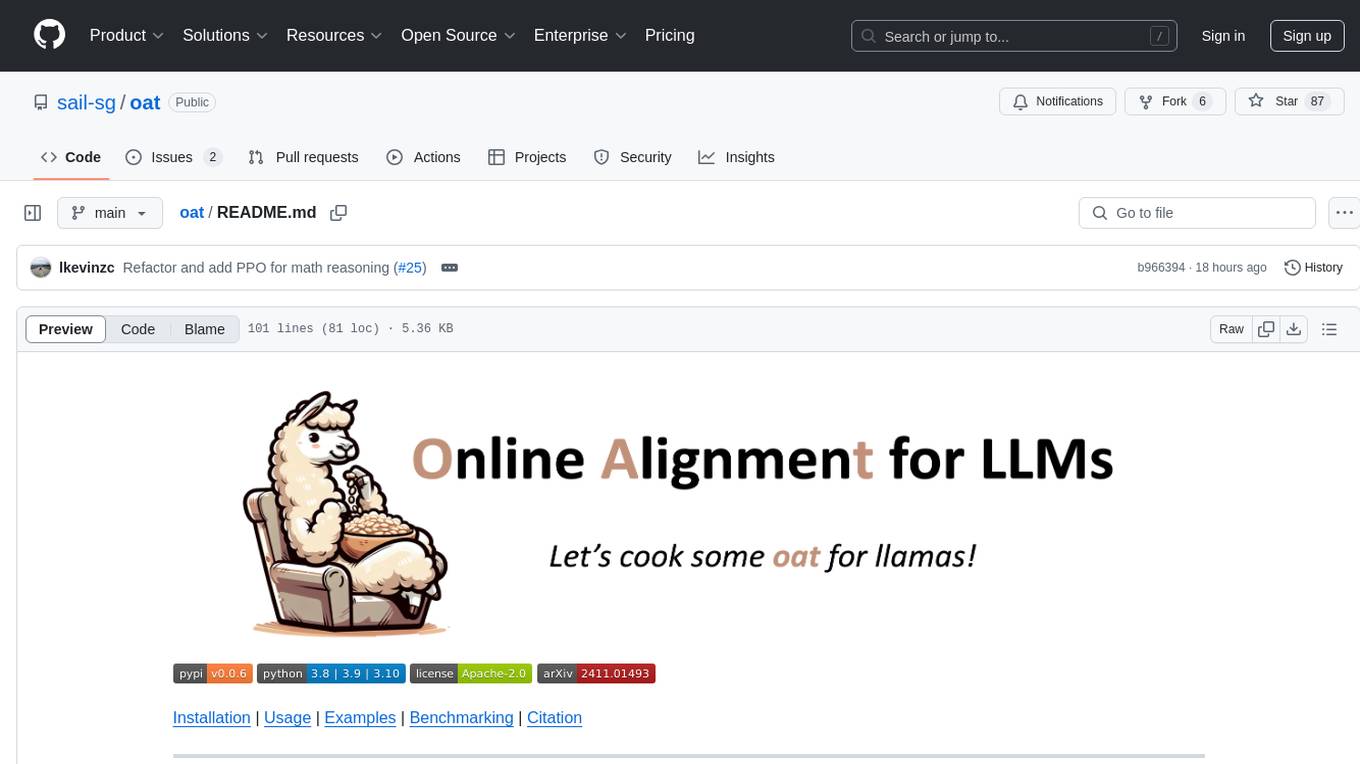
oat
Oat is a simple and efficient framework for running online LLM alignment algorithms. It implements a distributed Actor-Learner-Oracle architecture, with components optimized using state-of-the-art tools. Oat simplifies the experimental pipeline of LLM alignment by serving an Oracle online for preference data labeling and model evaluation. It provides a variety of oracles for simulating feedback and supports verifiable rewards. Oat's modular structure allows for easy inheritance and modification of classes, enabling rapid prototyping and experimentation with new algorithms. The framework implements cutting-edge online algorithms like PPO for math reasoning and various online exploration algorithms.
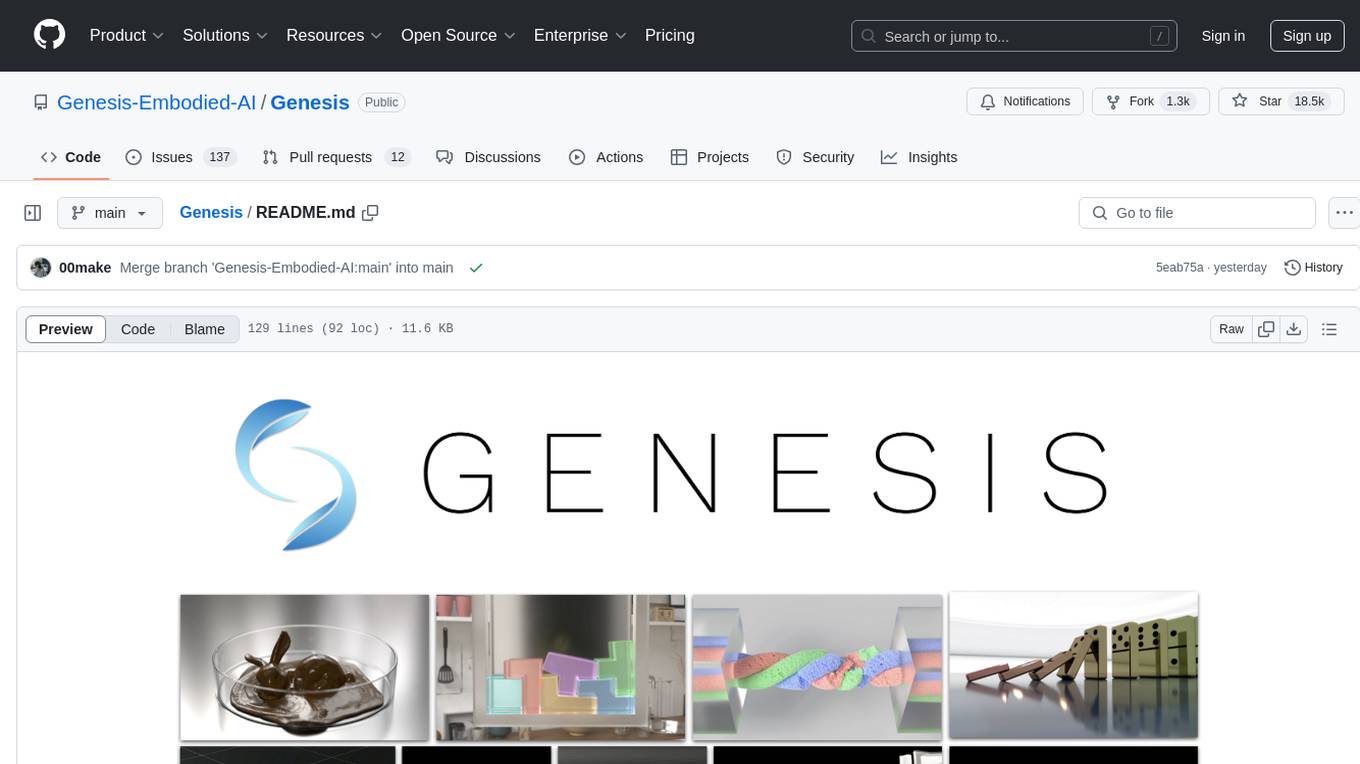
Genesis
Genesis is a physics platform designed for general purpose Robotics/Embodied AI/Physical AI applications. It includes a universal physics engine, a lightweight, ultra-fast, pythonic, and user-friendly robotics simulation platform, a powerful and fast photo-realistic rendering system, and a generative data engine that transforms user-prompted natural language description into various modalities of data. It aims to lower the barrier to using physics simulations, unify state-of-the-art physics solvers, and minimize human effort in collecting and generating data for robotics and other domains.

LMOps
LMOps is a research initiative focusing on fundamental research and technology for building AI products with foundation models, particularly enabling AI capabilities with Large Language Models (LLMs) and Generative AI models. The project explores various aspects such as prompt optimization, longer context handling, LLM alignment, acceleration of LLMs, LLM customization, and understanding in-context learning. It also includes tools like Promptist for automatic prompt optimization, Structured Prompting for efficient long-sequence prompts consumption, and X-Prompt for extensible prompts beyond natural language. Additionally, LLMA accelerators are developed to speed up LLM inference by referencing and copying text spans from documents. The project aims to advance technologies that facilitate prompting language models and enhance the performance of LLMs in various scenarios.
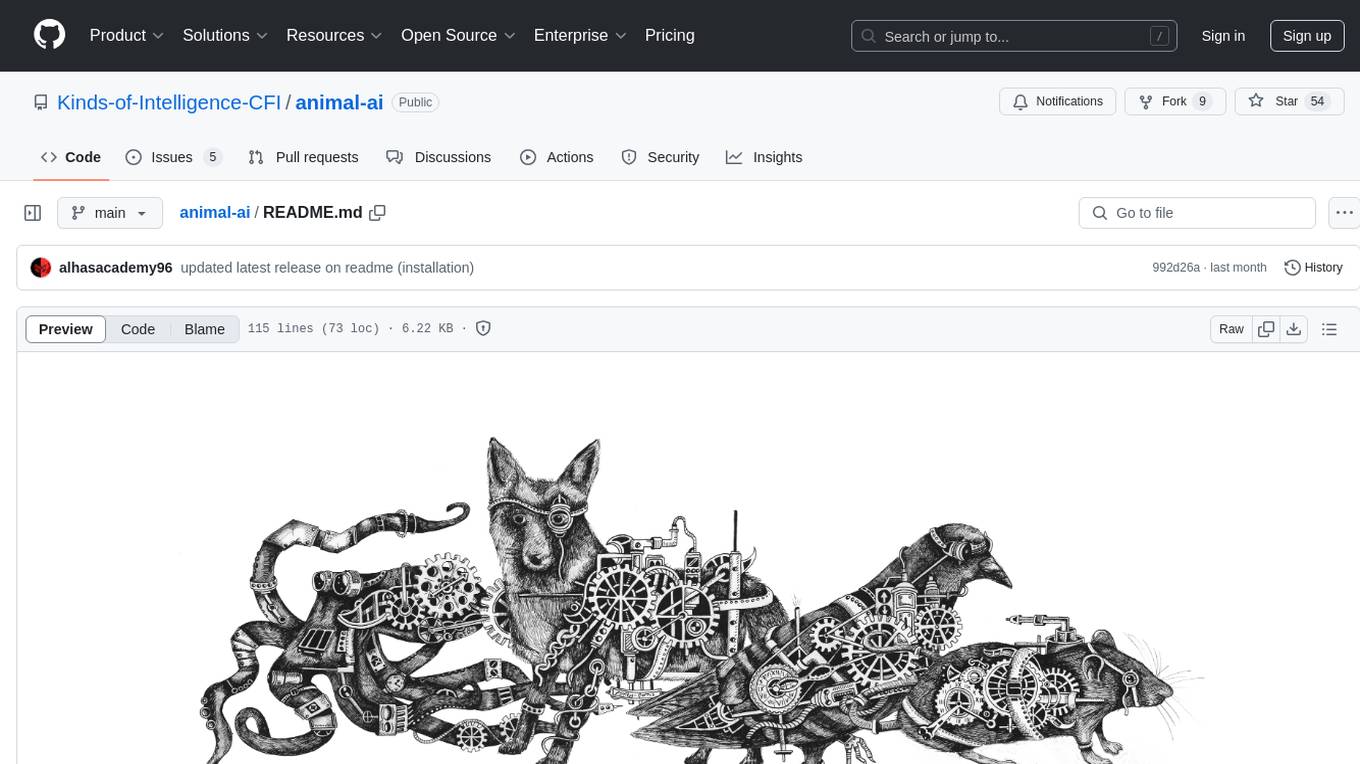
animal-ai
Animal-Artificial Intelligence (Animal-AI) is an interdisciplinary research platform designed to understand human, animal, and artificial cognition. It supports AI research to unlock cognitive capabilities and explore the space of possible minds. The open-source project facilitates testing across animals, humans, and AI, providing a comprehensive AI environment with a library of 900 tasks. It offers compatibility with Windows, Linux, and macOS, supporting Python 3.6.x and above. The environment utilizes Unity3D Game Engine, Unity ML-Agents toolkit, and provides interactive elements for AI training scenarios.
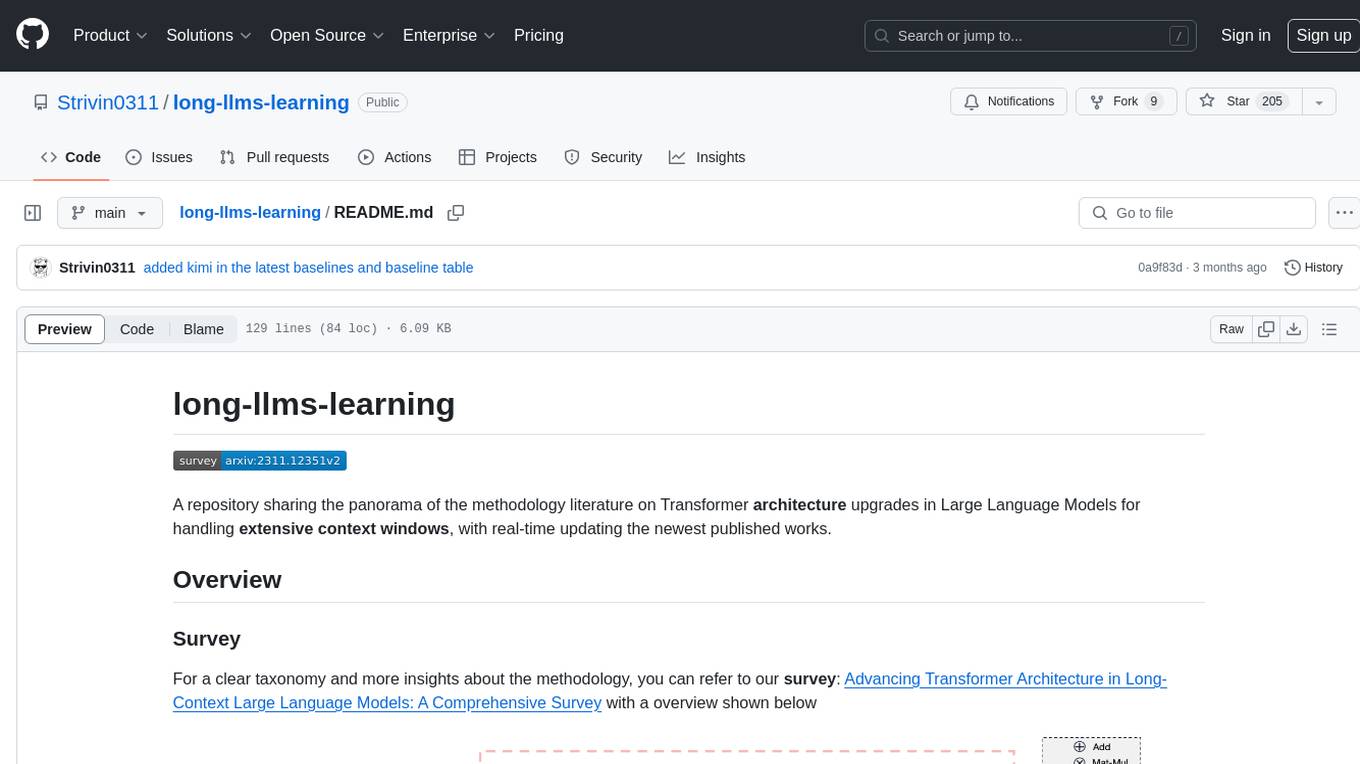
long-llms-learning
A repository sharing the panorama of the methodology literature on Transformer architecture upgrades in Large Language Models for handling extensive context windows, with real-time updating the newest published works. It includes a survey on advancing Transformer architecture in long-context large language models, flash-ReRoPE implementation, latest news on data engineering, lightning attention, Kimi AI assistant, chatglm-6b-128k, gpt-4-turbo-preview, benchmarks like InfiniteBench and LongBench, long-LLMs-evals for evaluating methods for enhancing long-context capabilities, and LLMs-learning for learning technologies and applicated tasks about Large Language Models.
For similar tasks

AI-lectures
AI-lectures is a repository containing educational materials on various topics related to Artificial Intelligence, including Machine Learning, Robotics, and Optimization. It provides full scripts, slides, and exercises with solutions for different lectures. Users can compile the materials into PDFs for easy access and reference. The repository aims to offer comprehensive resources for individuals interested in learning about AI and its applications in intelligent systems.
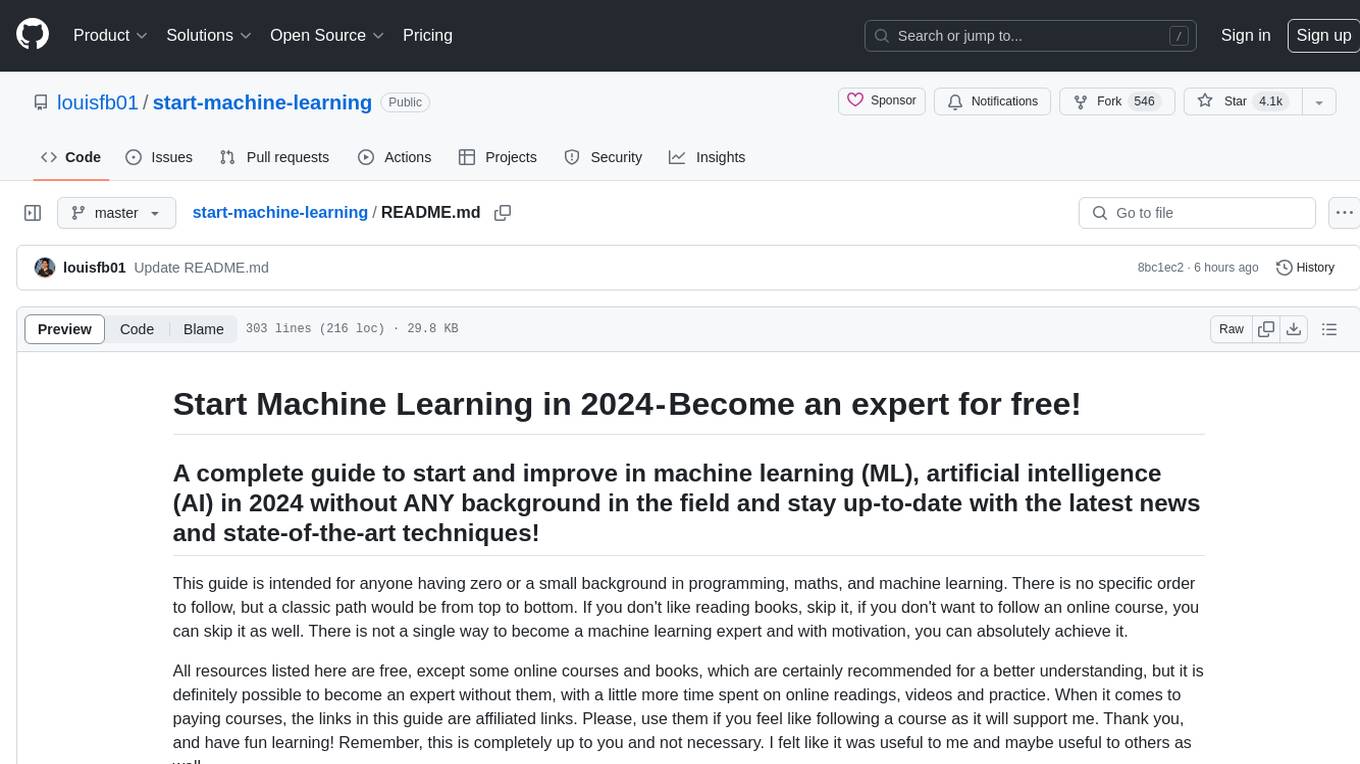
start-machine-learning
Start Machine Learning in 2024 is a comprehensive guide for beginners to advance in machine learning and artificial intelligence without any prior background. The guide covers various resources such as free online courses, articles, books, and practical tips to become an expert in the field. It emphasizes self-paced learning and provides recommendations for learning paths, including videos, podcasts, and online communities. The guide also includes information on building language models and applications, practicing through Kaggle competitions, and staying updated with the latest news and developments in AI. The goal is to empower individuals with the knowledge and resources to excel in machine learning and AI.
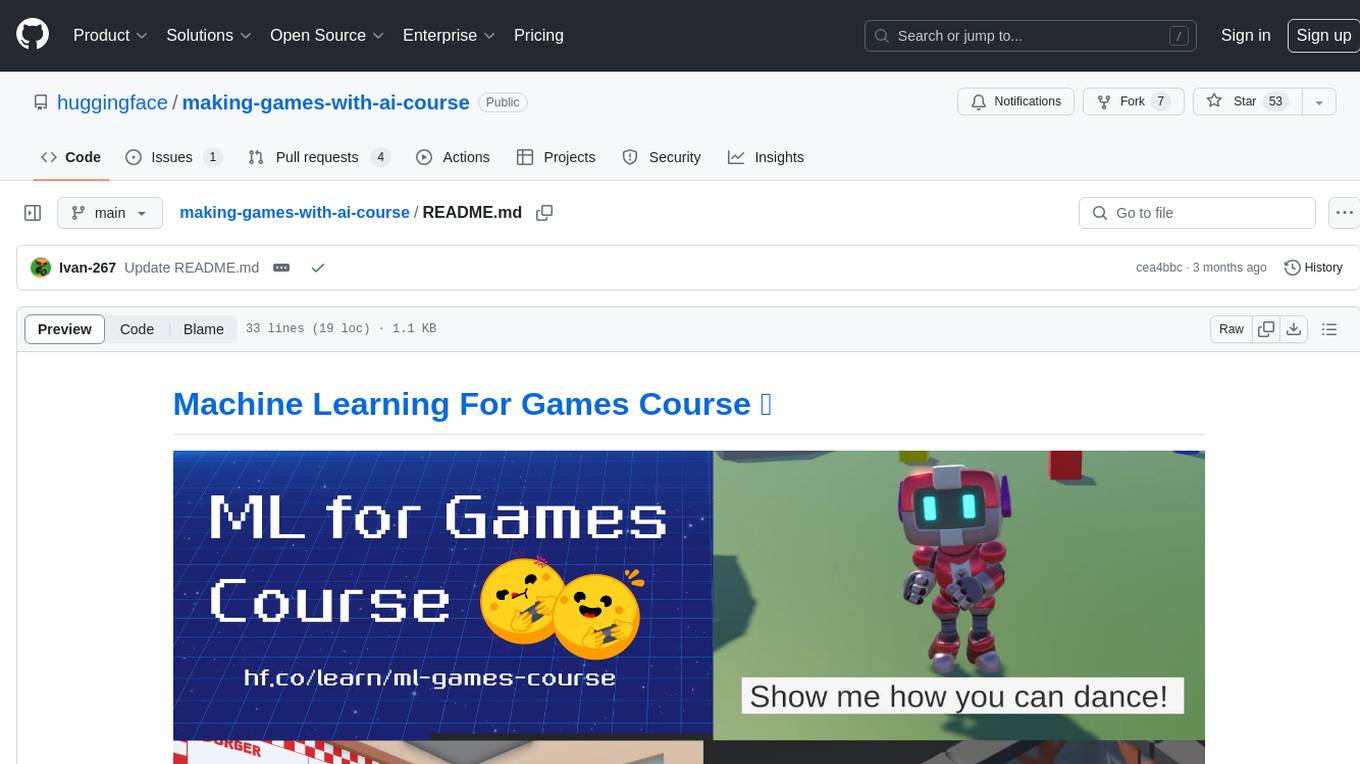
making-games-with-ai-course
This repository hosts the Machine Learning for Games Course, providing mdx files and notebooks for learning. The course covers various topics related to applying machine learning techniques in game development. It offers a syllabus and resources for users to sign up and access the content for free. The project is maintained by Thomas Simonini and is available on GitHub for citation in publications.
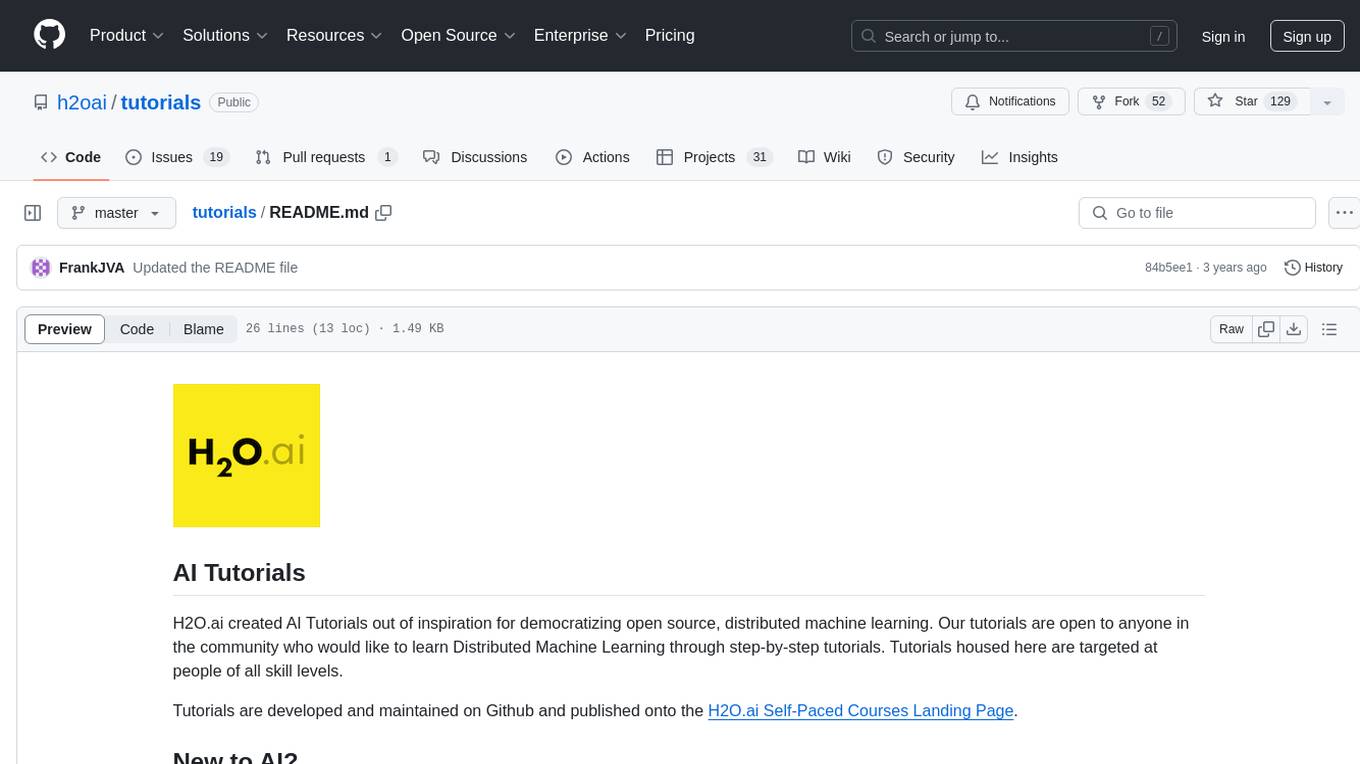
tutorials
H2O.ai's AI Tutorials aim to democratize open source, distributed machine learning by providing step-by-step tutorials for individuals of all skill levels. These tutorials are developed and maintained on Github and published on the H2O.ai Self-Paced Courses Landing Page. Users can begin their AI journey by exploring the tutorials available on the landing page and can contribute by fixing issues, updating tutorials, or creating new ones.
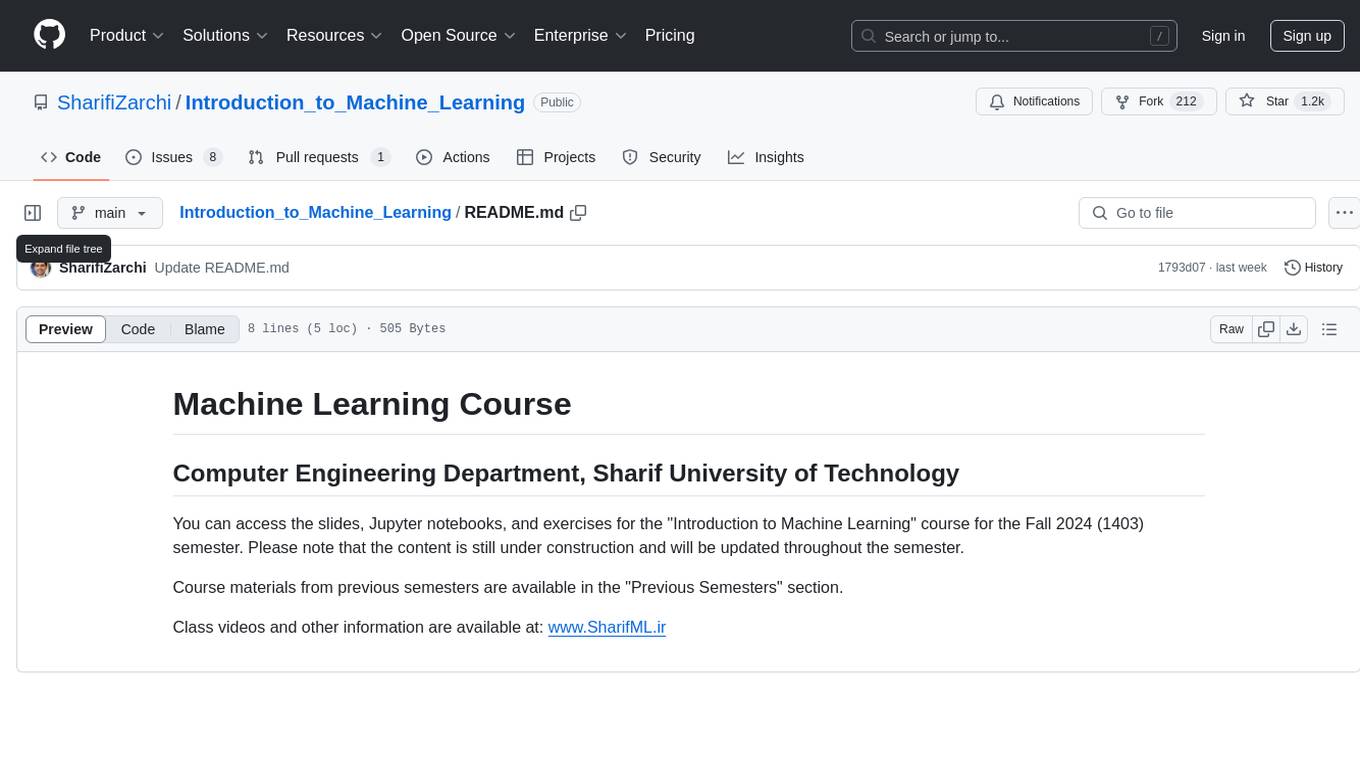
Introduction_to_Machine_Learning
This repository contains course materials for the 'Introduction to Machine Learning' course at Sharif University of Technology. It includes slides, Jupyter notebooks, and exercises for the Fall 2024 semester. The content is continuously updated throughout the semester. Previous semester materials are also accessible. Visit www.SharifML.ir for class videos and additional information.
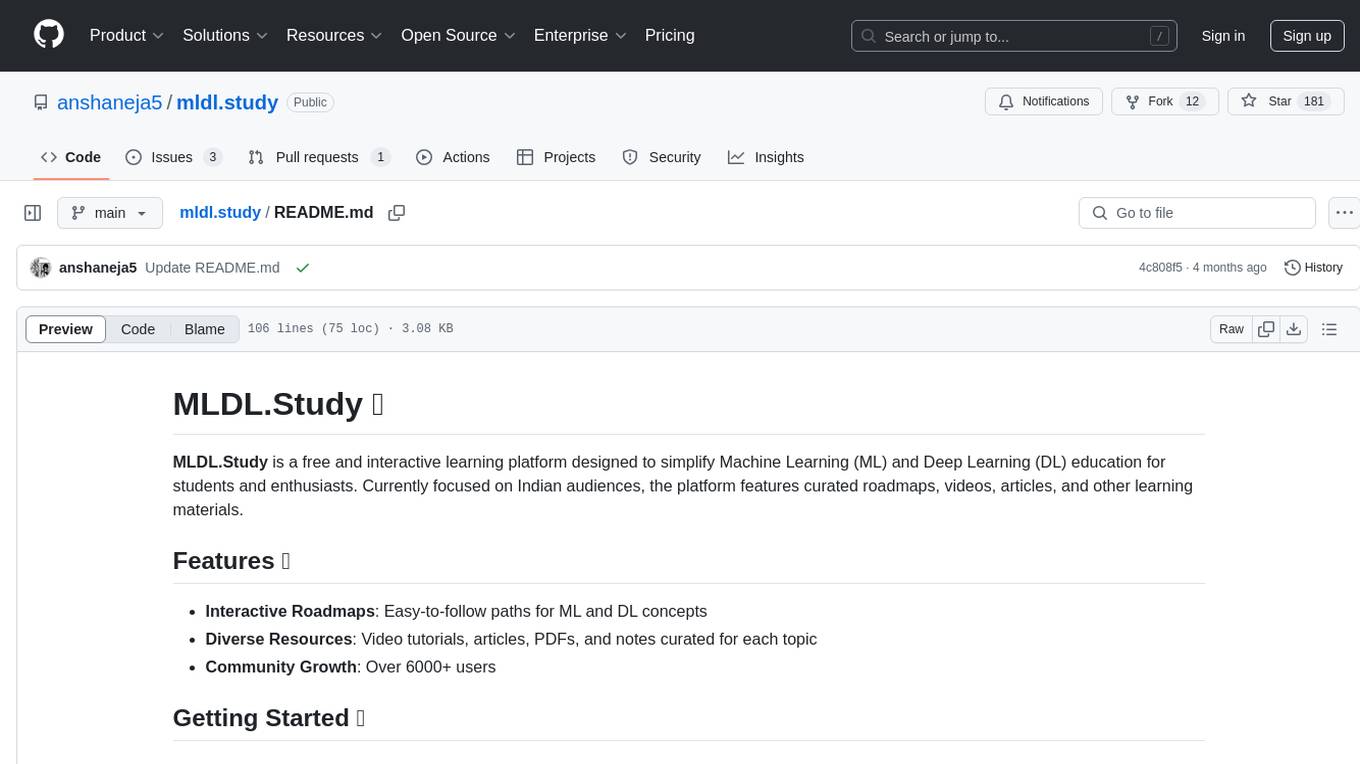
mldl.study
MLDL.Study is a free interactive learning platform focused on simplifying Machine Learning (ML) and Deep Learning (DL) education for students and enthusiasts. It features curated roadmaps, videos, articles, and other learning materials. The platform aims to provide a comprehensive learning experience for Indian audiences, with easy-to-follow paths for ML and DL concepts, diverse resources including video tutorials and articles, and a growing community of over 6000 users. Contributors can add new resources following specific guidelines to maintain quality and relevance. Future plans include expanding content for global learners, introducing a Python programming roadmap, and creating roadmaps for fields like Generative AI and Reinforcement Learning.
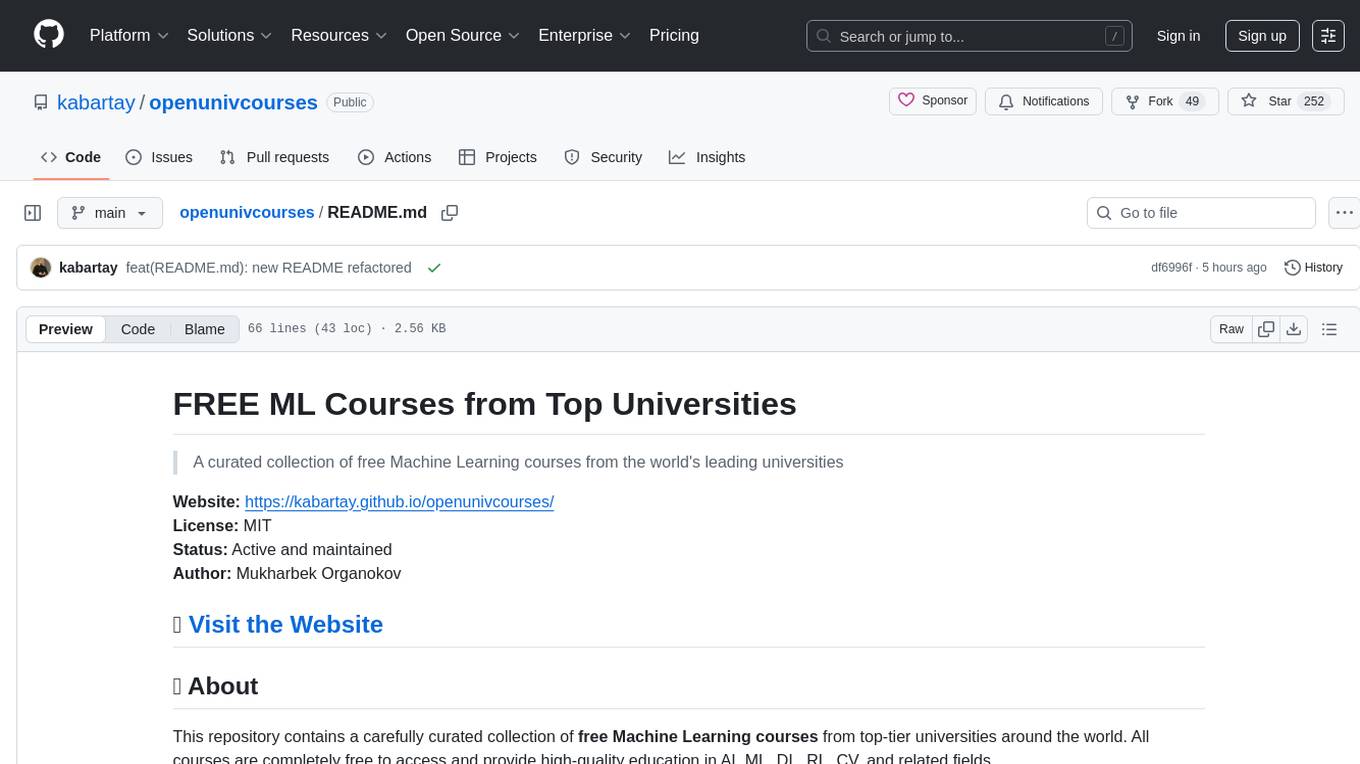
openunivcourses
OpenUnivCourses is a repository that provides free university courses in machine learning from top universities like MIT, Stanford, Berkeley, Carnegie Mellon, NYU, University of Michigan, University of Pennsylvania, University of Chicago, Purdue, Cornell, University of Oxford, and CalTech. The repository includes a wide range of courses covering topics such as deep learning, reinforcement learning, natural language processing, and more. Users can access lectures, notes, and videos from these prestigious institutions to enhance their knowledge and skills in the field of artificial intelligence and machine learning.
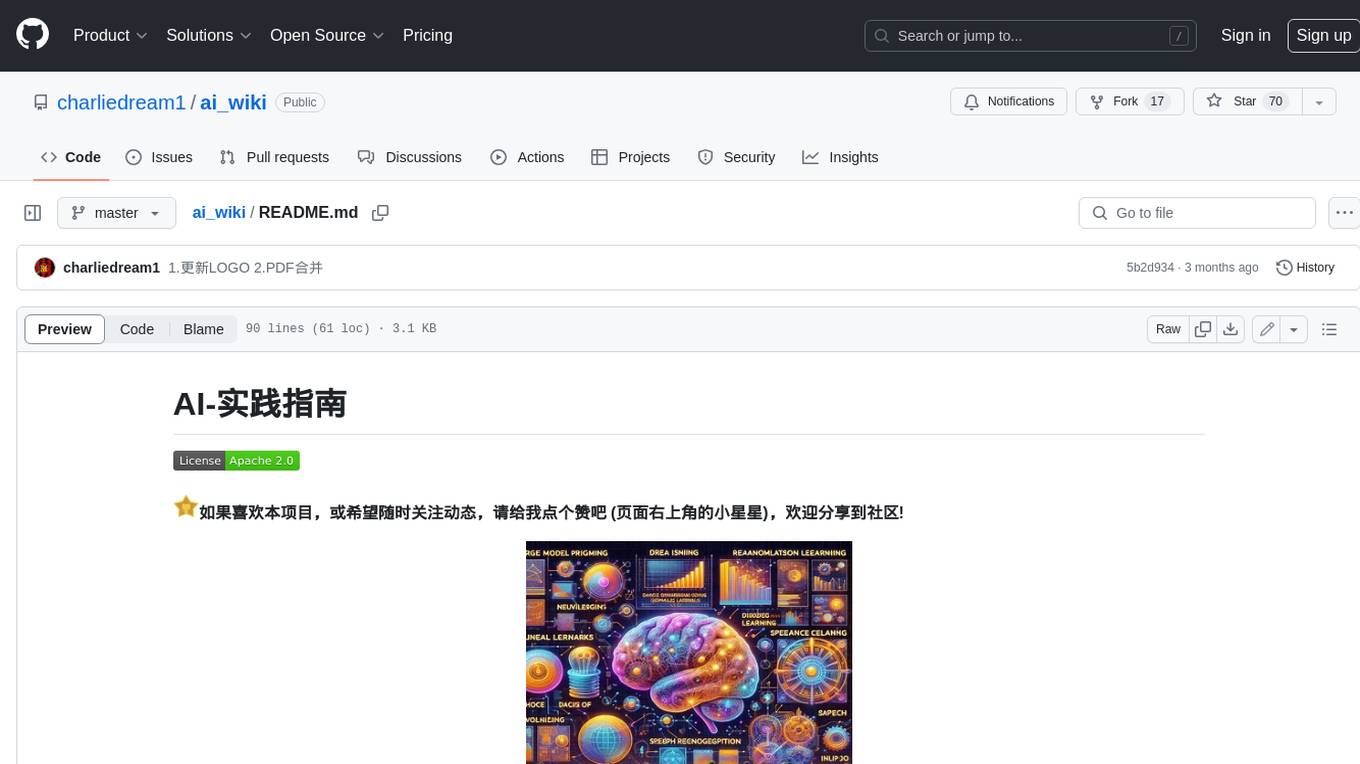
ai_wiki
This repository provides a comprehensive collection of resources, open-source tools, and knowledge related to quantitative analysis. It serves as a valuable knowledge base and navigation guide for individuals interested in various aspects of quantitative investing, including platforms, programming languages, mathematical foundations, machine learning, deep learning, and practical applications. The repository is well-structured and organized, with clear sections covering different topics. It includes resources on system platforms, programming codes, mathematical foundations, algorithm principles, machine learning, deep learning, reinforcement learning, graph networks, model deployment, and practical applications. Additionally, there are dedicated sections on quantitative trading and investment, as well as large models. The repository is actively maintained and updated, ensuring that users have access to the latest information and resources.
For similar jobs
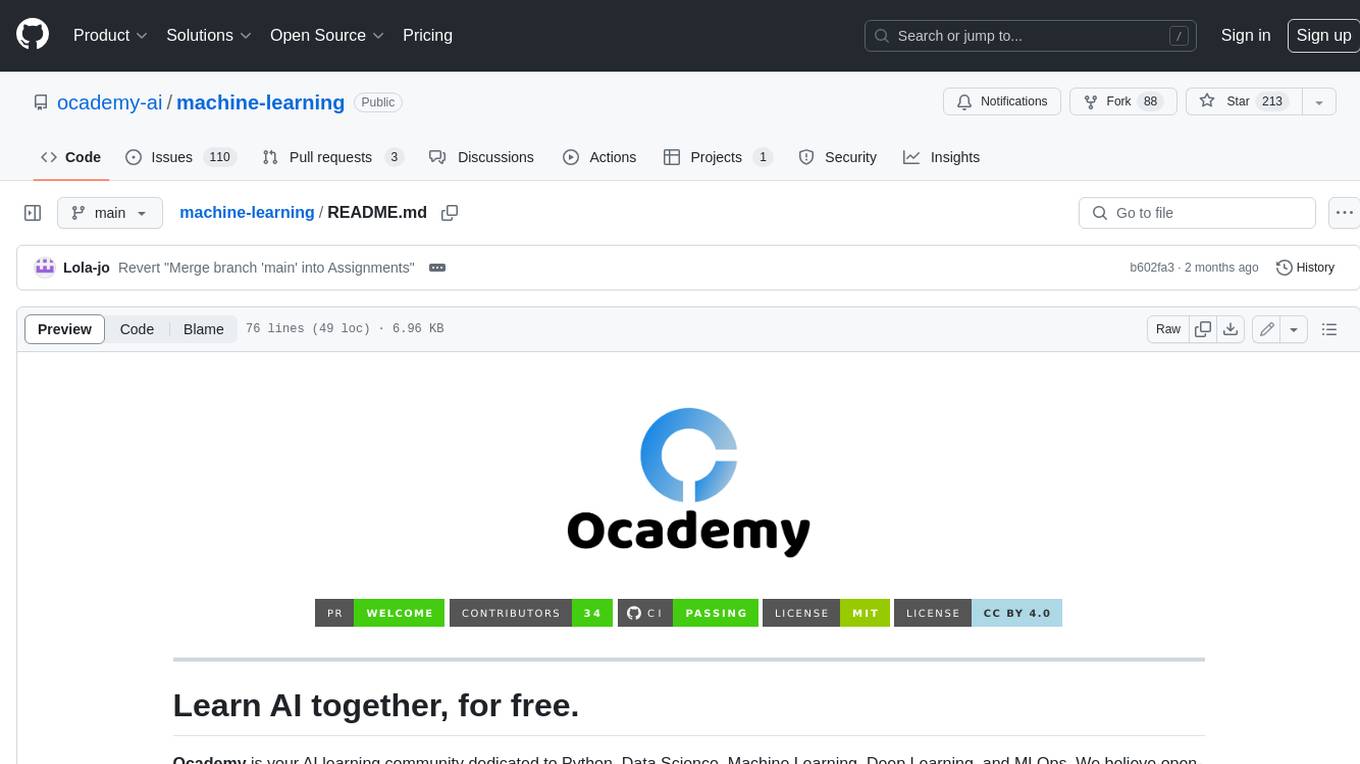
machine-learning
Ocademy is an AI learning community dedicated to Python, Data Science, Machine Learning, Deep Learning, and MLOps. They promote equal opportunities for everyone to access AI through open-source educational resources. The repository contains curated AI courses, tutorials, books, tools, and resources for learning and creating Generative AI. It also offers an interactive book to help adults transition into AI. Contributors are welcome to join and contribute to the community by following guidelines. The project follows a code of conduct to ensure inclusivity and welcomes contributions from those passionate about Data Science and AI.
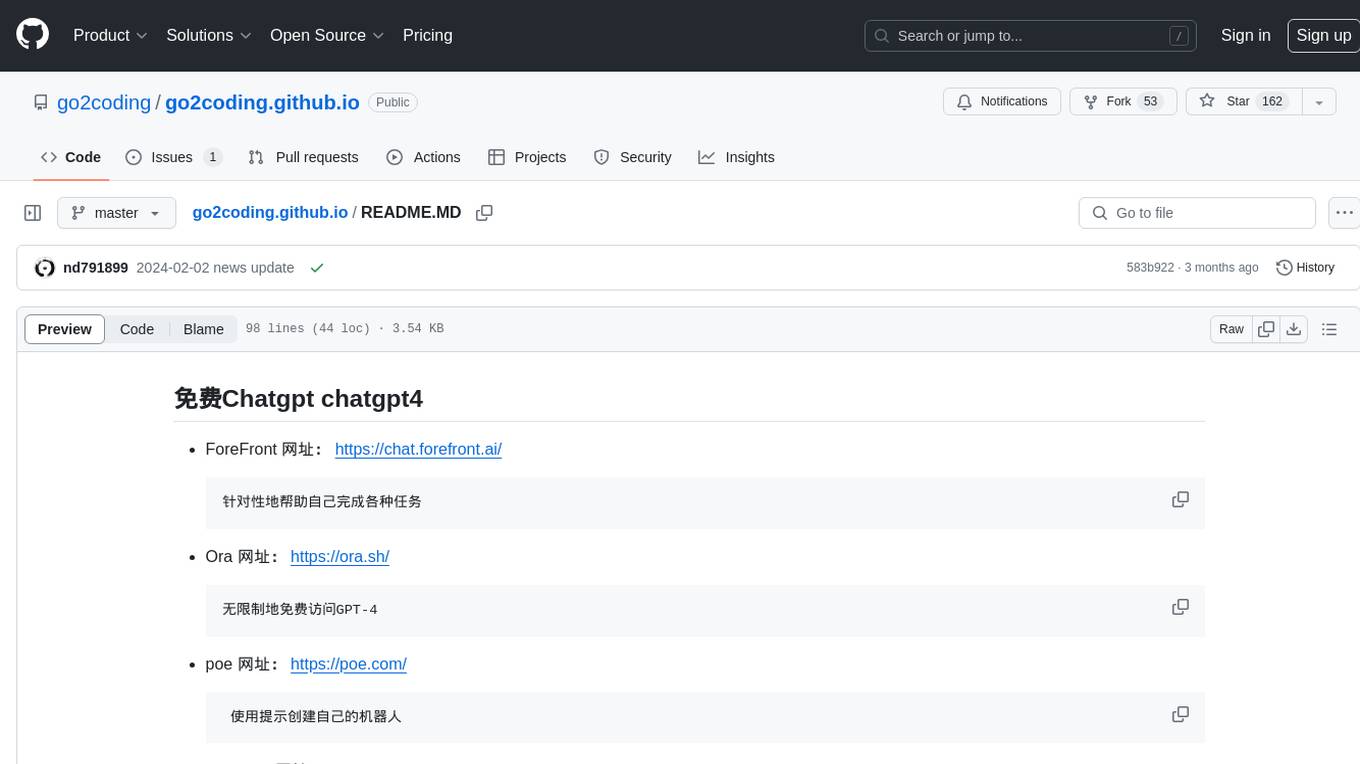
go2coding.github.io
The go2coding.github.io repository is a collection of resources for AI enthusiasts, providing information on AI products, open-source projects, AI learning websites, and AI learning frameworks. It aims to help users stay updated on industry trends, learn from community projects, access learning resources, and understand and choose AI frameworks. The repository also includes instructions for local and external deployment of the project as a static website, with details on domain registration, hosting services, uploading static web pages, configuring domain resolution, and a visual guide to the AI tool navigation website. Additionally, it offers a platform for AI knowledge exchange through a QQ group and promotes AI tools through a WeChat public account.
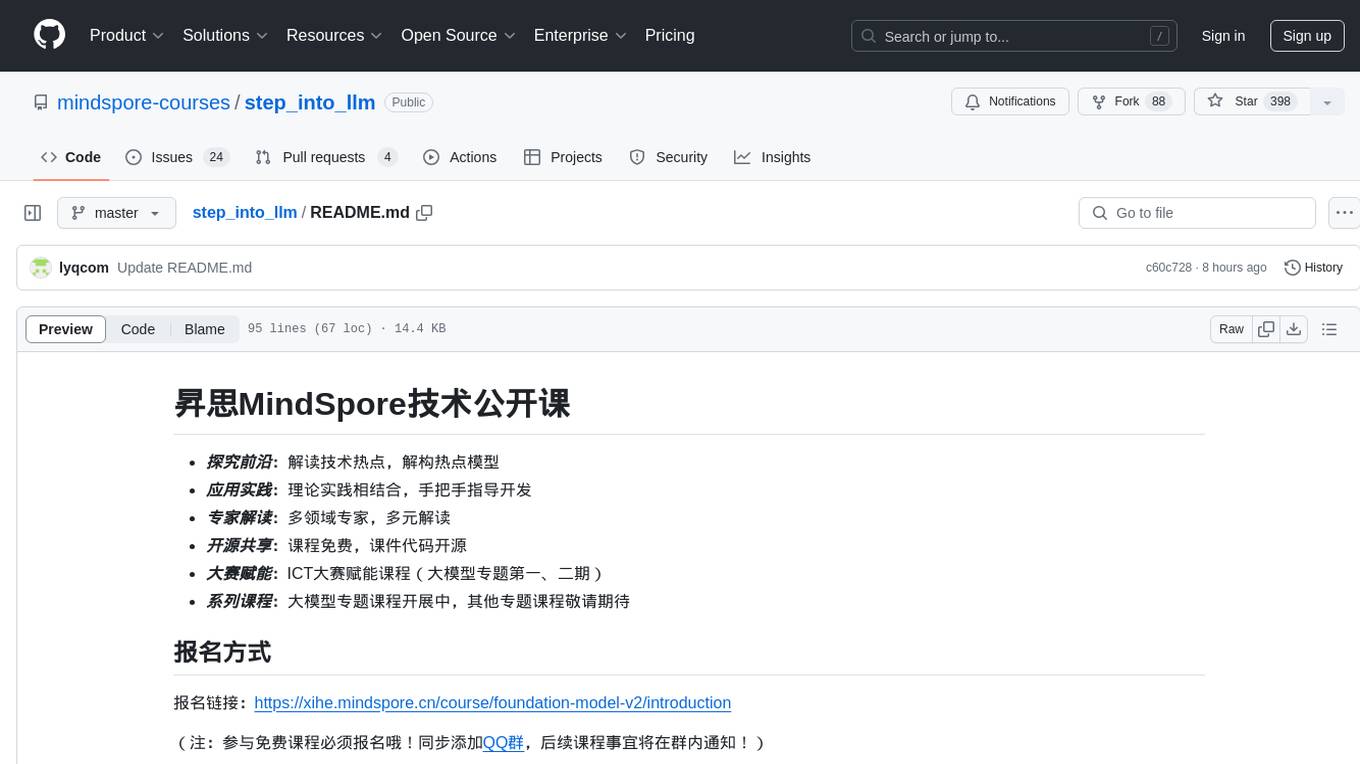
step_into_llm
The 'step_into_llm' repository is dedicated to the 昇思MindSpore technology open class, which focuses on exploring cutting-edge technologies, combining theory with practical applications, expert interpretations, open sharing, and empowering competitions. The repository contains course materials, including slides and code, for the ongoing second phase of the course. It covers various topics related to large language models (LLMs) such as Transformer, BERT, GPT, GPT2, and more. The course aims to guide developers interested in LLMs from theory to practical implementation, with a special emphasis on the development and application of large models.

AI-lectures
AI-lectures is a repository containing educational materials on various topics related to Artificial Intelligence, including Machine Learning, Robotics, and Optimization. It provides full scripts, slides, and exercises with solutions for different lectures. Users can compile the materials into PDFs for easy access and reference. The repository aims to offer comprehensive resources for individuals interested in learning about AI and its applications in intelligent systems.
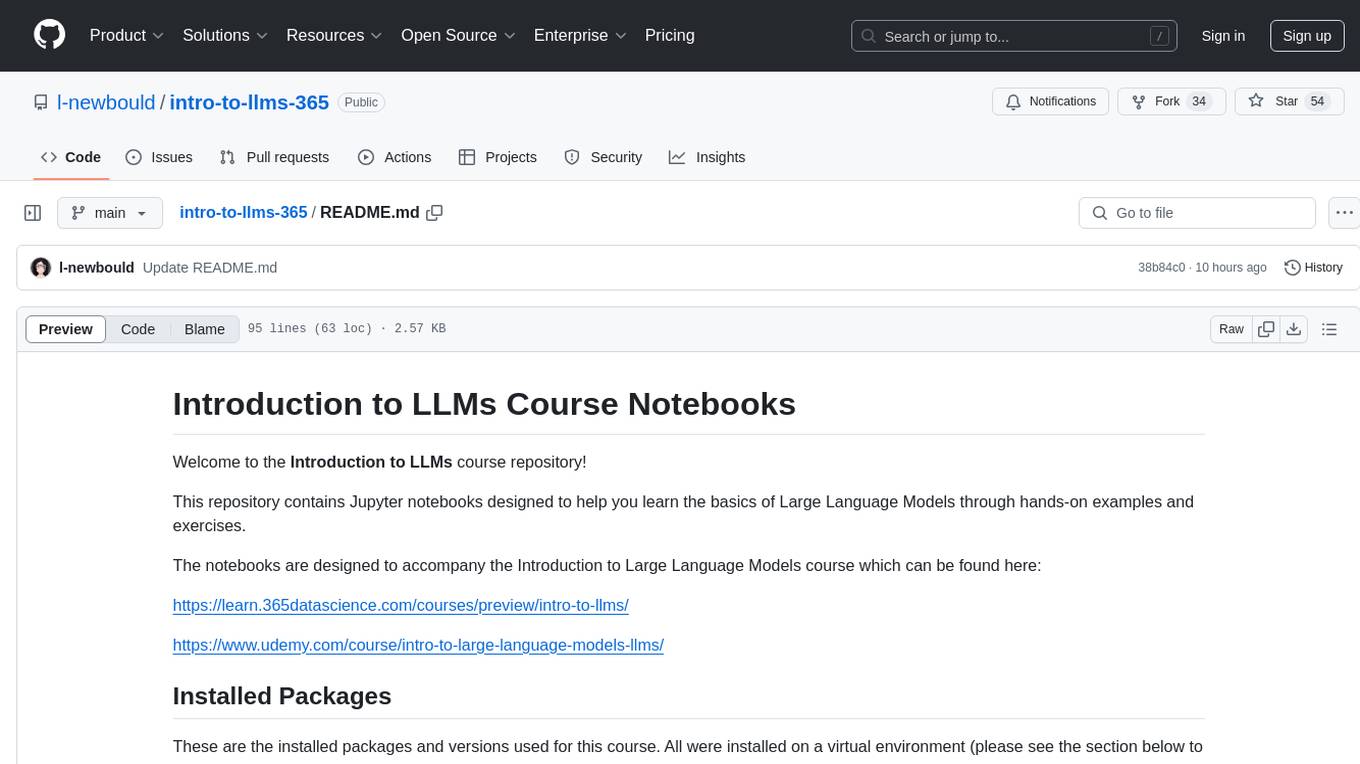
intro-to-llms-365
This repository serves as a resource for the Introduction to Large Language Models (LLMs) course, providing Jupyter notebooks with hands-on examples and exercises to help users learn the basics of Large Language Models. It includes information on installed packages, updates, and setting up a virtual environment for managing packages and running Jupyter notebooks.
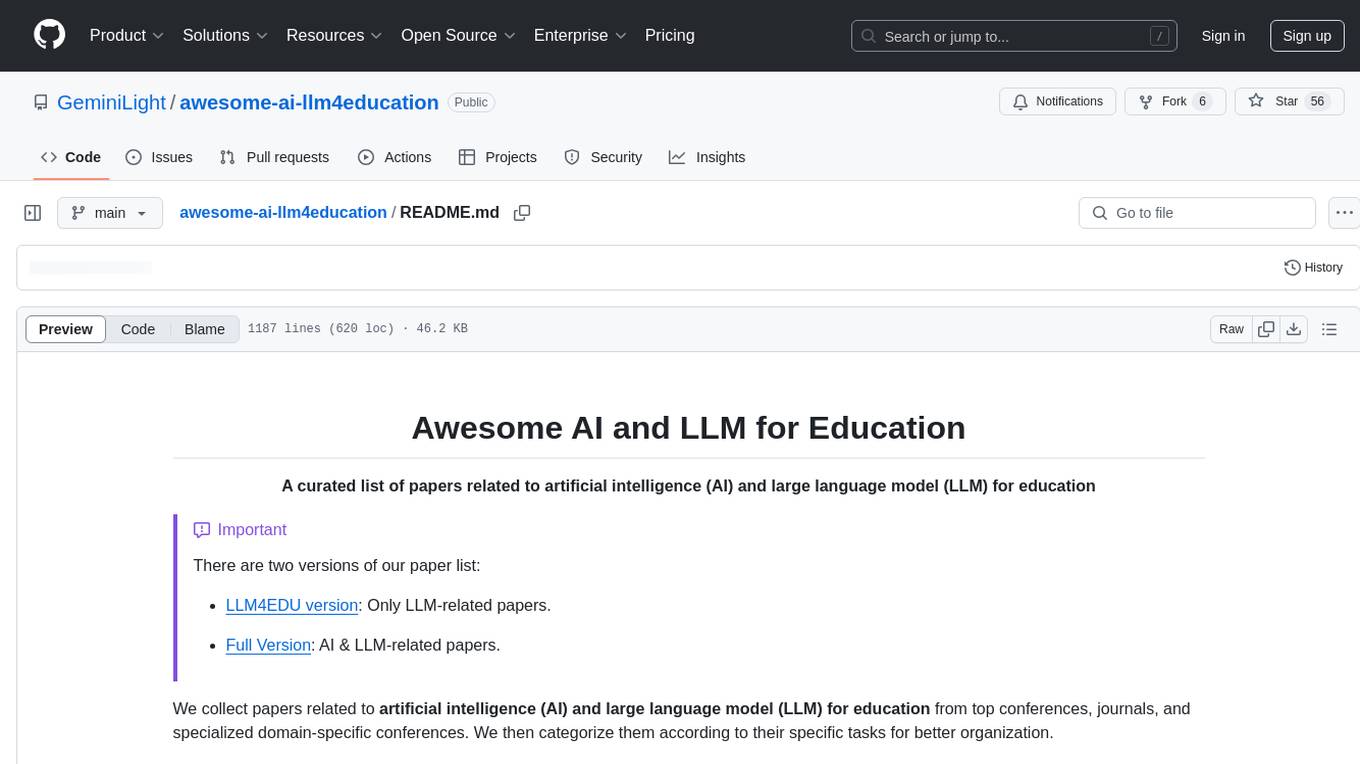
awesome-ai-llm4education
The 'awesome-ai-llm4education' repository is a curated list of papers related to artificial intelligence (AI) and large language models (LLM) for education. It collects papers from top conferences, journals, and specialized domain-specific conferences, categorizing them based on specific tasks for better organization. The repository covers a wide range of topics including tutoring, personalized learning, assessment, material preparation, specific scenarios like computer science, language, math, and medicine, aided teaching, as well as datasets and benchmarks for educational research.
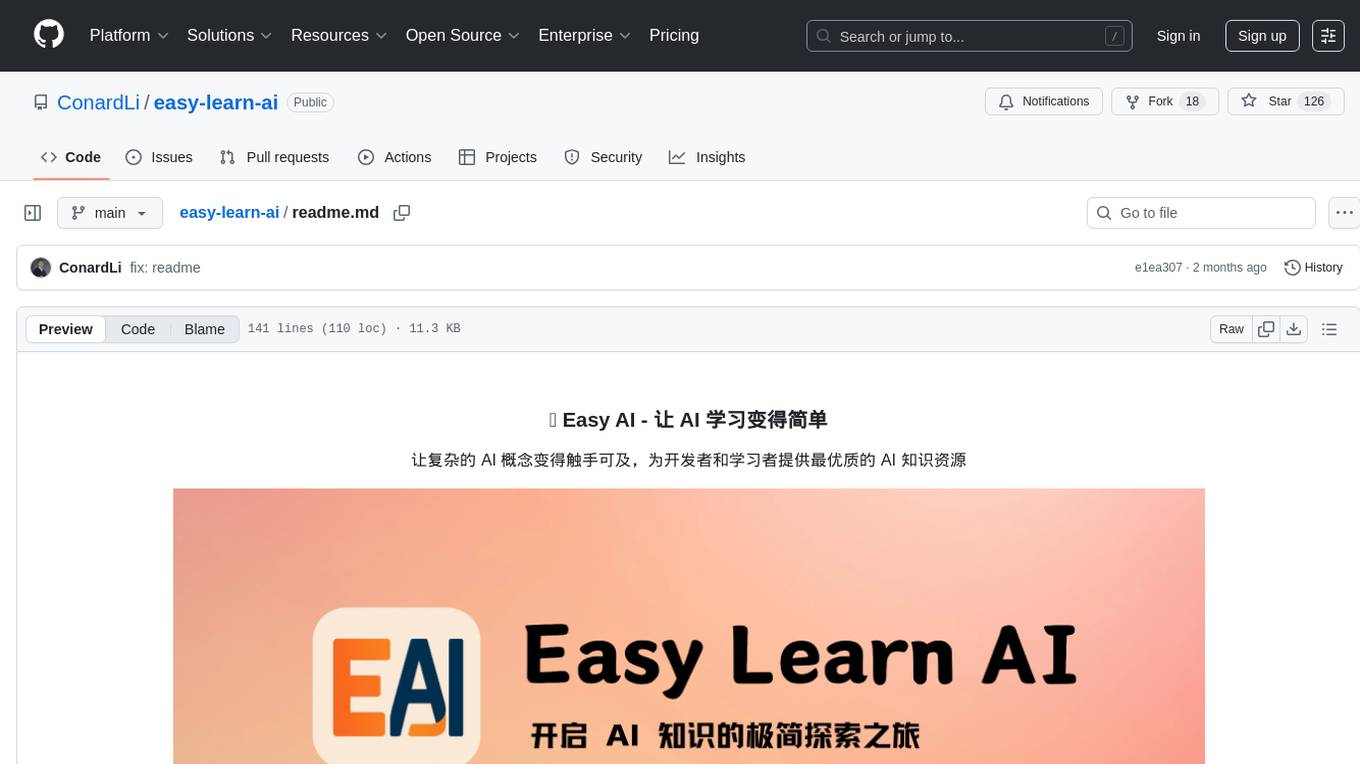
easy-learn-ai
Easy AI is a modern web application platform focused on AI education, aiming to help users understand complex artificial intelligence concepts through a concise and intuitive approach. The platform integrates multiple learning modules, providing a comprehensive AI knowledge system from basic concepts to practical applications.

weave
Weave is a toolkit for developing Generative AI applications, built by Weights & Biases. With Weave, you can log and debug language model inputs, outputs, and traces; build rigorous, apples-to-apples evaluations for language model use cases; and organize all the information generated across the LLM workflow, from experimentation to evaluations to production. Weave aims to bring rigor, best-practices, and composability to the inherently experimental process of developing Generative AI software, without introducing cognitive overhead.